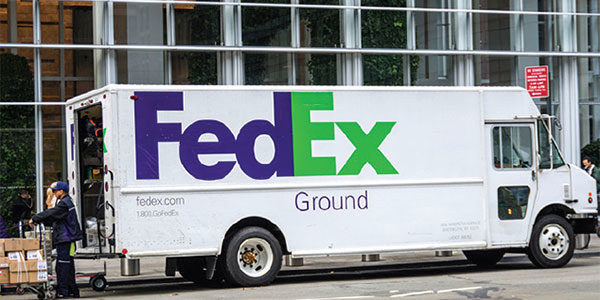Appeals court panel strikes down FedEx Ground independent contractor model in California

A three-judge federal appeals court panel in California today invalidated FedEx Corp.'s model of using independent contractors to operate ground delivery services in California and Oregon, ruling that FedEx exercises such control over the drivers so as to make them company employees under state law.
The ruling by the Ninth Circuit Court of Appeals isn't the first to question the legality of the FedEx independent contractor model on the grounds that the relationship between the company and its ground delivery drivers is so closely intertwined that they can't be considered contractors. However, the panel's ruling could be the most significant to date because it affects FedEx's operations in the nation's most populous state as well as the neighboring states that fall under the Ninth Circuit's jurisdiction.
The 35-page ruling consisted mostly of a 32-page opinion by Judge William A. Fletcher; the last three pages covered concurring opinions by Judges Alfred T. Goodwin and Stephen S. Trott. From a day-to-day business standpoint, Judge Trott may have made the most statement in the order by writing that the decision "substantially unravels FedEx's business model."
The ruling reverses a December 2010 decision by the Multidistrict Litigation Court (MDL) in Indianapolis that ruled the employees were independent contractors. The MDL, which is part of the federal court system, hears similar cases that have been brought in multiple jurisdictions. In this matter, FedEx requested that all the cases involving the employment status of its ground delivery drivers be consolidated in one region. The panel said that it will return the case to a federal district court in California for further consideration.
Concurrently, the panel ruled in two other cases that FedEx Ground drivers in Oregon who worked for the company from 1999 to 2009 should also be considered employees. Those rulings affect significantly fewer drivers than in California.
Judge Fletcher ruled that the operating agreement in California governing the relationship between FedEx and the approximately 2,300 individuals who made up the class of plaintiffs gave FedEx "a broad right to control the manner in which its drivers perform their work." Citing "powerful evidence" of company control over the drivers, Judge Fletcher ruled that they qualify as employees under California's "right-to-control" test. The individuals worked full time for FedEx Ground in the state from 2000 to 2007.
The judge also noted comments by a number of drivers that they had believed they would be granted "entrepreneurial opportunities" under the relationship, but discovered that they were limited in what they could do beyond what the company had expressly stipulated.
In a statement, FedEx said it will appeal the panel's ruling and will seek review from the entire Ninth Circuit. It said the panel rendered a decision on a model that is no longer in use. Since 2011, FedEx Ground has only contracted with incorporated businesses that treat their drivers as their employees, the company said. FedEx said that over the years it has "significantly strengthened" the operating agreement that served as the basis for the panel's adverse ruling.
The company said in the statement that it will shift to new independent service-provider (ISP) agreements in California, Oregon, Washington, and Nevada, four of the states where the Ninth Circuit holds jurisdiction. Such agreements typically involve larger geographic service areas from which contractors can operate, according to Patrick Fitzgerald, a FedEx spokesman. FedEx operates through an ISP in 17 states; the company plans to provide details on the extended agreement in October, Fitzgerald said.
Aaron Kaufmann, an attorney for the plaintiffs, acknowledged that FedEx Ground has made changes to its contractor operating model. However, he contended that the changes might not have been substantial enough to persuade the courts that its drivers are truly independent contractors. "If they drive vans with FedEx's logo on it, wear FedEx uniforms, and deliver exclusively FedEx packages, then I would question it," he said.
In a statement, Beth Ross, the lead plaintiffs' attorney, said FedEx's current model in California is structured around contractors who then hire a "secondary work force" of drivers who essentially do the same work as the plaintiffs and under the same contract. Ross said that she's heard of many instances where the so-called secondary drivers are earning such low wages that they must rely on public assistance to make ends meet.
Related Articles

Copyright ©2024. All Rights ReservedDesign, CMS, Hosting & Web Development :: ePublishing